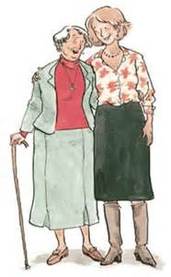 This week is Back Care Awareness Week. Run by the charity, Back Care, the UK's National Back Pain Association, the focus this year is on back pain experienced by carers. I see many carers in clinic, and whether they are doing it as paid employment, or caring for a loved one at home, they often end up neglecting themselves. This is critical - not only do they need to be fit and well in order to provide the care and support that is required of them, but putting up with back pain can wear you down. There are some startling statistics! There are currently around 6.5 million carers in the UK with the figure set to rise to 9 million by 2037[1]. For many carers physical activity such as lifting is a significant part of their daily routine. However, not all carers will be aware of their back health when looking after someone. Although paid carers may receive training on how to protect their backs during the physical aspects of their work, many unpaid carers, of which there are 5.8 million in England and Wales[2], may not receive any training or information about back care. It's often these people back at home that are most at risk - they don't have the adequate training or equipment, like hoists, to ensure that they do things safely. Day in, day out, the repetitive movements and heavy lifting can take its toll, overloading the body and causing strains and injuries. It is worth contacting Social Services as often there is equipment available on loan that can make life easier and reduce the risk of injury. [1] Statistics taken from Carers UK http://www.carersuk.org/newsroom/stats-and-facts [2] According to data from the Office of National Statistics from the 2011 census However, there are a few things that carers can think of which may help prevent back and neck pain: Golden rules for carers · Think ahead - assess each situation and look for the best and easiest way to achieve the desired result, this may mean using any available equipment whether it be for specialist lifting or a simple sack barrow for moving boxes of supplies. · Follow the weight - always try and face the direction in which you want to carry any weight - your body is strongest when you are square on to the weight, so don't twist from your hips. · Take care when lifting - never lift while twisting from the waist. Bend your knees, try to have a relaxed, straight back and if possible, brace your abdominal muscles. For added stability make sure that your feet are about a shoulder width or more apart before lifting. · Ask for training - whether you are caring in a formal setting or helping someone at home, make sure you have been properly trained in how to use any equipment. · Supportive shoes are essential - wear good, soft-soled shoes that are supportive and have a good grip on the ground. · Take regular breaks - if doing a repetitive task, take a break every 20 minutes and do some simple stretches to relax your muscles. Following this simple advice can sometimes make all the difference, and ease the physical strain of being a carer. It's important to remember your emotional and psychological needs too - being a full-time carer can be a thankless task, particularly when circumstances have changed and you end up having to care for someone who has previously been a companion and soul-mate. Make sure you take time out for yourself - you need to 'recharge' - and take up people on their offers of help! There's a very simple three minute exercise routine entitled ‘Straighten Up UK’ that has been developed by the British Chiropractic Association (BCA) which is really easy to incorporate into daily life to help strengthen the spine and improve posture. This can help to stretch out the muscles and joints of the body, easing aches and pains. For further advice, just ask me at the Llangefni Chiropractic Clinic - and don't ignore any persistent niggles!
0 Comments
|
Ceri AnnEich Ceiropractydd yng Nghlinig Ceiropracteg Llangefnii Blogumulus by Roy Tanck and Amanda Fazani
Archives
June 2020
|
Llangefni Chiropractic Clinic, 6 GlanHwfa Rd, Llangefni LL777EN, Anglesey, North Wales, UK privacy policy Llangefni Chiropractic Clinic 2020
 RSS Feed
RSS Feed



